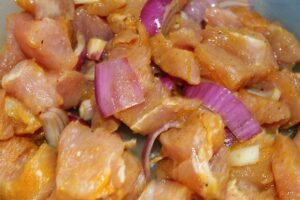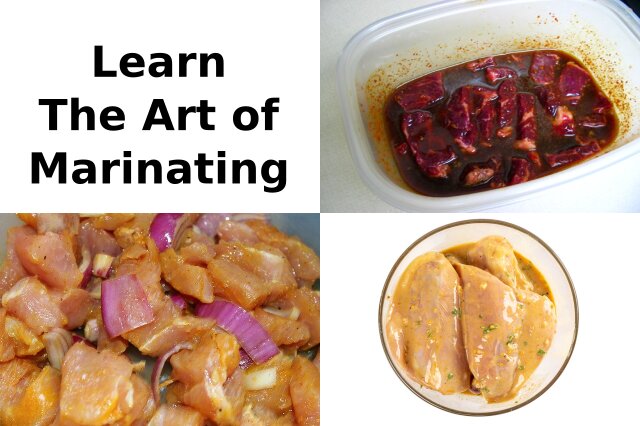The Art of Marination: Enhancing Flavours One Dish at a Time
Discover the art of marination and learn how to enhance flavours in your dishes with this comprehensive guide. Explore different marinating techniques and recipes that will elevate your culinary creations to the next level.
Step into a world of tantalising flavours and mouthwatering aromas as we embark on a culinary journey exploring the art of marination.
Whether you’re a seasoned chef or an amateur cook, mastering the technique of marinating can elevate your dishes to a whole new level of deliciousness.
Marination is the process of infusing food with a combination of flavours through the use of marinades.
From tangy citrus marinades to rich and savoury herb concoctions, the possibilities are endless.
By allowing meat, seafood, or even vegetables to sit in a flavourful marinade, the ingredients can absorb the flavours, resulting in enhanced taste and tenderness.
But marination is not just about adding flavour; it’s also a method of tenderising tougher cuts of meat, allowing them to become more succulent and easier to chew.
Time and patience are crucial when it comes to marinating.
Allowing the ingredients to marinate for a sufficient amount of time ensures that the flavours penetrate deep into every bite.
Join us as we delve into the world of marination, exploring the science behind the technique and sharing mouthwatering recipes that will leave your taste buds begging for more.
Get ready to take your culinary skills to the next level with the art of marination.
[lwptoc]
The science behind marination.
 Marination is not just about adding flavour; it’s also a method of tenderising tougher cuts of meat, allowing them to become more succulent and easier to chew.
Marination is not just about adding flavour; it’s also a method of tenderising tougher cuts of meat, allowing them to become more succulent and easier to chew.
So, what happens during the marination process?
When meat, seafood, or even vegetables are marinated, the flavours from the marinade penetrate into the food through a process called osmosis.
Osmosis is the movement of water molecules from an area of lower concentration to an area of higher concentration.
In the case of marination, the marinade’s flavours are dissolved in water, and the food absorbs these flavours as the water molecules move into the food.
To make the most of the marination process, it’s important to understand that different ingredients in the marinade play different roles.
For example, acids like lemon juice or vinegar help break down the proteins in meat, making it more tender.
On the other hand, salt helps to season the food while also drawing out moisture, intensifying the flavours.
Benefits of marination.
Marinating your ingredients offers several benefits beyond enhancing flavours.
- One of the key advantages is the tenderising effect it has on meat and other proteins.
Tough cuts of meat can be transformed into succulent and juicy delights with the help of a well-marinated dish.
- Additionally, marination helps to ensure even cooking.
When meat is marinated, it absorbs the flavours throughout, preventing the outer layer from being overly seasoned while the centre remains bland.This results in a more balanced and flavourful dish.
- Furthermore, marinating can also extend the shelf life of certain ingredients.
The acid in the marinade helps to inhibit the growth of harmful bacteria, allowing the food to stay fresh for longer.
Common marinade ingredients.
Marinades can be made using a wide variety of ingredients, each contributing its own unique flavour profile.
Some common marinade ingredients include:
- Citrus:
- Lemon, lime, and orange juices add a tangy zest to marinades while also tenderising the meat.
- Herbs and Spices:
- Fresh or dried herbs like rosemary, thyme, and oregano, along with spices such as cumin, paprika, and chili powder, can add depth and complexity to marinades.
- Soy Sauce:
- This savoury ingredient brings a rich umami flavour to the marinade, especially in Asian-inspired dishes.
- Garlic and Onion:
- These aromatic ingredients add a fragrant and savoury note to marinades, enhancing the overall flavour of the dish.
- Oil:
- Olive oil, sesame oil, or even vegetable oil can help bind the flavours together and prevent the food from sticking to the grill or pan.
- Yoghurt:
- Yoghurt is a good source of lactic acid, which helps to tenderise the meat.
It also adds a creamy texture to the marinade. - Brown Sugar:
- Brown sugar is often used in marinades.
It adds sweetness, depth of flavour, and caramelisation to the meat.Brown sugar is also a good natural tenderiser, as it helps to break down the fibres in the meat.
- Mustard:
- Mustard is a tangy condiment that can add flavour and moisture to marinades.
It also helps to tenderise the meat.
Remember, the key to a successful marinade is finding the right balance of flavours.
Experiment with different combinations of ingredients to create your own signature marinade.
Marinating techniques and tips.
To achieve the best results when marinating, it’s important to follow a few key techniques and tips:
- Choose the Right Container:
- Use a non-reactive container like glass or stainless steel for marinating.
Avoid using aluminum or copper containers, as they can react with the acidic components of the marinade.
- Allow Sufficient Time:
- Different ingredients require different marinating times.
Generally, meats benefit from marinating for at least 30 minutes to several hours, while denser proteins like tofu may need longer marinating times to absorb flavours fully.
- Refrigerate Properly:
- Always marinate in the refrigerator to prevent bacterial growth. If you’re marinating meat, make sure it is securely covered and placed on the bottom shelf to prevent any cross-contamination.
- Avoid Over-Marinating:
- While marinating adds flavour, over-marinating can lead to a mushy texture.
Be mindful of the marinating times specified in recipes to avoid this.
- Reserve Some Marinade:
- If you plan to use the marinade as a sauce or glaze, set aside a portion before marinating the food.
Do not use the marinade that has been in contact with raw meat or seafood.
By following these techniques and tips, you’ll be well on your way to mastering the art of marination.
Marinating different types of proteins – meat, poultry, seafood, and tofu.
Marinating techniques can vary depending on the type of protein you’re working with.
Let’s take a look at the best practices for marinating different proteins:
- Meat:
- Marinating meat can transform tough cuts into tender, flavourful masterpieces.
The key is to choose the right marinade and allow sufficient time for the flavours to work their magic.When marinating Beef, opt for acidic marinades that contain ingredients like citrus juice or vinegar.
The acid helps to break down the connective tissues in the meat, resulting in a more tender texture.For Pork, a marinade with a touch of sweetness, such as honey or brown sugar, can complement the meat’s natural flavours.
- Poultry:
- Chicken and other poultry can benefit from marination, as it adds moisture and flavour to the meat, which tends to be leaner compared to other proteins.
Acidic marinades work well with poultry, but be cautious not to marinate for too long, as the acid can break down the meat’s texture.
To infuse flavour into poultry, consider using marinades that incorporate herbs like thyme or rosemary, along with a hint of garlic.
For an extra kick, add some chili flakes or a splash of hot sauce. - Seafood:
- Seafood, such as fish or shrimp, can be delicate, so care must be taken when marinating.
The marinade should enhance and complement the seafood’s natural flavours without overpowering them.Acidic marinades featuring ingredients like citrus or vinegar work well with seafood, but be mindful of the marinating time.
Seafood tends to cook quickly, and over-marinating can lead to an undesirable texture.
- Tofu:
- For those who prefer plant-based proteins, marinating tofu can add depth and complexity to this versatile ingredient.
Tofu has a porous texture, allowing it to absorb flavours readily.
Marinating tofu can help enhance its taste and mimic the flavours of meat or seafood.Choose marinades that contain soy sauce or tamari, along with your preferred herbs and spices.
Let the tofu marinate for an extended period, even up to several hours or overnight, to ensure it absorbs the flavours fully.
Marinating vegetables and fruits.
Marination is not limited to meats and proteins. Vegetables and fruits can also benefit from this technique, adding an extra dimension of flavour to vegetarian or vegan dishes.
- Vegetables:
- When marinating vegetables, choose ingredients that complement their natural sweetness or earthy flavours.
Olive oil, balsamic vinegar, garlic, and herbs like basil or thyme can bring out the best in vegetables.
Let the vegetables marinate for at least 30 minutes to allow the flavours to develop fully.
- Fruits:
- Similarly, fruits can be marinated to enhance their taste and create unique flavour combinations.
Citrus fruits, such as oranges or lemons, can add a refreshing zing to fruits like strawberries or watermelon.
Sweet spices like cinnamon or nutmeg can also be used to complement the natural sweetness of fruits.
Marinating for different cuisines – Asian, Mediterranean, and BBQ.
Marination techniques can vary across different cuisines, each offering its own distinct flavours and aromas. Let’s explore how marination is used in Asian, Mediterranean, and BBQ cuisines.
- Asian Cuisine:
- Asian marinades often incorporate a combination of soy sauce, ginger, garlic, and other aromatic ingredients.
These marinades lend a sweet, savoury, and umami flavour profile to meats, poultry, seafood, and tofu.
They are commonly used in stir-fries, grilling, or as a base for sauces.
- Mediterranean Cuisine:
- Mediterranean marinades often feature ingredients like olive oil, lemon juice, garlic, and herbs like rosemary and oregano.
These marinades infuse meats and vegetables with a fresh and herbaceous flavour profile.
They are commonly used in kebabs, grilled vegetables, or as a dressing for salads.
- BBQ Cuisine:
- BBQ marinades are often rich and smoky, with a combination of spices, herbs, and acidic ingredients.
These marinades are typically used on meats and poultry before grilling or smoking.
They can include ingredients like molasses, brown sugar, Worcestershire sauce, or even a touch of bourbon, resulting in a sweet and tangy flavour profile.
Marination recipes for inspiration.
To get you started on your marination journey, here are a few mouthwatering recipes that showcase the art of marinating.
These recipes are just a starting point, so feel free to experiment with different ingredients and flavours to create your own signature marination combinations.
Citrus-Marinated Grilled Chicken.
 Citrus-marinated grilled chicken is a delicious and refreshing dish that is perfect for a summer barbecue.
Citrus-marinated grilled chicken is a delicious and refreshing dish that is perfect for a summer barbecue.
The citrus juice and zest in the marinade tenderise the chicken and give it a bright and tangy flavour.
The chicken can be grilled to perfection, resulting in a juicy and flavourful dish that everyone will love.
Ingredients:
- 450 grams (1 pound) boneless, skinless chicken breasts or thighs
- ¼ cup olive oil
- ¼ cup lemon juice
- ¼ cup lime juice
- ¼ cup orange juice
- 1 tablespoon grated lemon zest
- 1 tablespoon grated lime zest
- 1 tablespoon grated orange zest
- 1 teaspoon garlic powder
- ½ teaspoon salt
- ¼ teaspoon black pepper
Instructions:
- In a large bowl, combine the olive oil, lemon juice, lime juice, orange juice, lemon zest, lime zest, orange zest, garlic powder, salt, and pepper. Whisk to combine.
- Add the chicken to the bowl and toss to coat in the marinade.
Cover the bowl with plastic wrap and refrigerate for at least 30 minutes, or up to overnight.
- Preheat the grill to medium-high heat.
- Remove the chicken from the marinade and discard the marinade.
- Grill the chicken for 6-8 minutes per side, or until cooked through.
- Serve immediately and enjoy!
Tips:
- If you are using chicken breasts, be sure to pound them to an even thickness before marinating.
This will help them cook evenly. - If you are using chicken thighs, you can marinate them for up to 24 hours for maximum flavour.
- Be careful not to overcook the chicken, or it will become dry.
- Serve the chicken with your favourite sides, such as rice, roasted vegetables, or a Salad.
Variations:
- For a spicier marinade, add a pinch of cayenne pepper or red pepper flakes.
- For a sweeter marinade, add a tablespoon of honey or maple syrup.
- To add more herbs and spices, try adding some dried oregano, basil, or thyme to the marinade.
- For a fun twist, try marinating the chicken in coconut milk and lime juice.
Citrus-marinated grilled chicken is a delicious and versatile dish that can be enjoyed for any occasion.
It is easy to make and can be customised to your liking.
So next time you are looking for a quick and easy weeknight meal, or a dish to impress your guests, give citrus-marinated grilled chicken a try!
Teriyaki Marinated Salmon.
 Teriyaki marinated salmon is a delicious and easy-to-make dish that is perfect for any occasion.
Teriyaki marinated salmon is a delicious and easy-to-make dish that is perfect for any occasion.
The salmon is marinated in a sweet and savory teriyaki sauce, then grilled or baked to perfection.
The result is a juicy and flavourful salmon dish that everyone will love.
Ingredients:
- 4 180 gram (6-ounce) salmon fillets
- ¼ cup soy sauce
- ¼ cup mirin (sweet rice wine)
- ¼ cup sake (Japanese rice wine)
- ¼ cup brown sugar
- 1 tablespoon grated ginger
- 1 tablespoon minced garlic
Instructions:
- In a large bowl, whisk together the soy sauce, mirin, sake, brown sugar, ginger, and garlic.
- Add the salmon fillets to the bowl and toss to coat in the marinade.
Cover the bowl with plastic wrap and refrigerate for at least 30 minutes, or up to overnight. - Preheat the grill or oven to medium-high heat.
- If grilling, remove the salmon from the marinade and discard the marinade.
Grill the salmon for 6-8 minutes per side, or until cooked through. - If baking, place the salmon fillets in a baking dish and bake for 12-15 minutes, or until cooked through.
- Serve immediately and enjoy!
Tips:
- If you are using boneless, skinless salmon fillets, you can skip the step of removing the skin.
However, if you are using bone-in, skin-on salmon fillets, be sure to remove the skin before grilling or baking.
- If you are grilling the salmon, be careful not to overcook it, or it will become dry.
- If you are baking the salmon, place the baking dish on the middle rack of the oven.
- Serve the salmon with your favorite sides, such as rice, roasted vegetables, or a salad.
Variations:
- For a spicier marinade, add a pinch of cayenne pepper or red pepper flakes.
- For a sweeter marinade, add a tablespoon of honey or maple syrup.
- To add more herbs and spices, try adding some dried oregano, basil, or thyme to the marinade.
- If you don’t have mirin or sake, you can substitute white wine or rice vinegar.
Teriyaki marinated salmon is a delicious and versatile dish that can be enjoyed for any occasion.
It is easy to make and can be customised to your liking.
So next time you are looking for a quick and easy weeknight meal, or a dish to impress your guests, give teriyaki marinated salmon a try!
Greek Marinated Lamb Chops.
 Greek marinated lamb chops are a delicious and easy-to-make dish that is perfect for any occasion.
Greek marinated lamb chops are a delicious and easy-to-make dish that is perfect for any occasion.
The lamb is marinated in a flavorful blend of olive oil, lemon juice, garlic, oregano, and thyme, then grilled or baked to perfection.
The result is a juicy and tender lamb dish that is sure to please everyone at the table.
Ingredients:
- 8 lamb rib chops, about 2.5cm (1 inch) thick
- ¼ cup olive oil
- ¼ cup lemon juice
- 2 tablespoons minced garlic
- 1 teaspoon dried oregano
- ½ teaspoon dried thyme
- ½ teaspoon salt
- ¼ teaspoon black pepper
Instructions:
- In a large bowl, whisk together the olive oil, lemon juice, garlic, oregano, thyme, salt, and pepper.
- Add the lamb chops to the bowl and toss to coat in the marinade.
Cover the bowl with plastic wrap and refrigerate for at least 30 minutes, or up to overnight. - Preheat the grill or oven to medium-high heat.
- If grilling, remove the lamb chops from the marinade and discard the marinade.
Grill the lamb chops for 3-4 minutes per side, or until cooked through.
- If baking, place the lamb chops on a baking sheet lined with parchment paper.
Bake for 10-12 minutes, or until cooked through.
- Serve immediately and enjoy!
Tips:
- For extra flavour, marinate the lamb chops overnight in the refrigerator.
- If you are grilling the lamb chops, be careful not to overcook them, or they will become dry.
- Serve the lamb chops with your favorite sides, such as Rice, Roast vegetables, or a Greek salad.
Variations:
- For a spicier marinade, add a pinch of red pepper flakes.
- For a sweeter marinade, add a tablespoon of honey or maple syrup.
- To add more herbs and spices, try adding some dried rosemary, mint, or dill to the marinade.
- If you don’t have a grill, you can also cook the lamb chops in a skillet over medium-high heat for 3-4 minutes per side, or until cooked through.
Greek marinated lamb chops are a delicious and versatile dish that can be enjoyed for any occasion.
They are easy to make and can be customised to your liking.
So next time you are looking for a quick and easy weeknight meal, or a dish to impress your guests, give Greek marinated lamb chops a try!
Conclusion: Elevating your dishes with the art of marination.
As we conclude our culinary journey through the art of marination, we hope you’ve gained a deeper understanding of how this technique can enhance the flavours and tenderness of your dishes.
From understanding the science behind marination to exploring different marinade ingredients, techniques, and cuisines, you now have the tools to take your culinary skills to the next level.
So, the next time you’re in the kitchen, unleash your creativity and experiment with marination.
Let the flavours mingle and dance on your taste buds, as you transform simple ingredients into culinary masterpieces.
The possibilities are endless, and the art of marination is your key to unlocking a world of unforgettable flavours.
Happy marinating!
